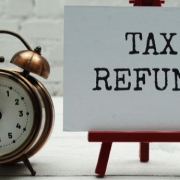The IRS Is Going Paperless: Here’s How That Will Change Your Taxes
The world is becoming increasingly digital, and soon, taxes will be no exception.
In an effort to modernize tax filing, the IRS is working to be paperless by 2025.
“The IRS paperless processing initiative aims to streamline and modernize the tax-filing process by eliminating paper forms and enabling electronic submissions. The initial rollout has already begun, with plans to expand across all tax forms and processes over the next few years,” says Dana Ronald, CEO of Tax Crisis Institute, a tax relief company servicing California and Nevada.
The process will certainly come with benefits for taxpayers – including faster processing times – but there will be some drawbacks as well.
What Does The IRS Paperless Initiative Entail?
The IRS initiative is working toward a fully paperless system by 2025, but changes will be made in stages over the next two years.
“For the 2024 filing season (which typically starts in late January), taxpayers are expected to be able to electronically respond to all IRS notices, correspondence and other non-tax forms,” says Miri Abrams Forster, partner and national tax controversy leader at Eisner Advisory Group LLC’s Tax Controversy & Dispute Resolution practice group.
She adds that 20 additional tax forms will be available for e-filing during the 2024 filing season and that the IRS aims to make another 150 frequently used non-tax forms mobile friendly for the 2025 filing season. The plan also involves digitizing any paper returns during the transition period and making remaining paper correspondence digital by 2026.
How Will Paperless Taxes Affect Taxpayers?
This new platform will not only reduce waste, but it should mean taxpayers will experience an easier filing process and the IRS will have faster processing times.
“However, taxpayers must remember that some changes may require adjustments and patience as the new system is implemented fully,” Ronald says.
It’s also important that taxpayers are wary of scammers attempting to take advantage of this transition to steal data, even though the IRS is dedicated to avoiding this, Forster says.
Paperless Tax Filing Pros
For the most part, this paperless processing should benefit taxpayers.
“The expectation is that it will expedite the processing of returns and refunds and allow customer service representatives to address errors and resolve issues more quickly, rather than allocate time to the manual input of paper filed documentation,” Forster says.
Doing your taxes will also be more mobile friendly.
“More forms will be available in a digital format that is optimized for mobile devices as many Americans rely solely on smart phones for internet access. Also, the IRS will be able to leverage data scientists and advanced analytics – making it easier to catch tax evasion or fraud,” says Charles Corsello, an enrolled agent and co-founder of TaxCure, a platform that connects people to local tax professionals.
Paperless Tax Filing Cons
New digital systems bring increased potential for fraud. Digital correspondence is frequently mimicked by cybercriminals in an effort to steal data, and taxpayers will need to be increasingly vigilant.
Additionally, a fully digital system means that all taxpayers will need access to reliable internet and technology, Ronald says. This could create an accessibility problem.
“There are also concerns if the IRS’s digital system is robust and ready to handle the increased loads, as this could lead to outages or system delays,” Corsello says.
Preparing For Paperless Taxes
While paperless taxes should benefit both the environment and taxpayers, the transition will require some effort to ensure it proceeds smoothly.
“Since hackers are becoming more sophisticated in their tactics, everyone needs to take necessary precautions to protect their personal and financial information. As always, staying informed about these changes and meeting tax-filing requirements will ensure a smooth transition into the new system,” Ronald says.
According to Corsello, taxpayers should keep a close eye on IRS announcements throughout the rollout so they know what services are available and when.
Source: U.S. News & World Report





